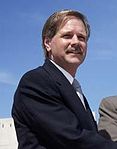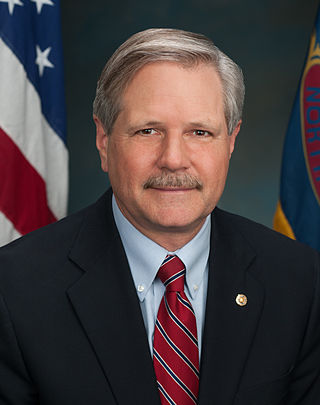
John Henry Hoeven III is an American banker and politician serving as the senior U.S. senator from North Dakota, a seat he has held since 2011. A member of the Republican Party, Hoeven served as the 31st governor of North Dakota from 2000 to 2010.

Mary Kathryn "Heidi" Heitkamp is an American politician who served as a United States senator from North Dakota from 2013 to 2019. A member of the North Dakota Democratic–Nonpartisan League Party, she was the first woman elected to the U.S. Senate from North Dakota. Heitkamp served as the 28th North Dakota attorney general from 1992 to 2000 and 20th North Dakota tax commissioner from 1986 to 1992. As of 2023, she is the last Democrat to have represented North Dakota in Congress, and the last to hold statewide office.

The 2006 United States Senate election in North Dakota was held November 7, 2006. Incumbent Democratic-NPL U.S. Senator Kent Conrad won re-election to a fourth term.

United States gubernatorial elections were held on November 7, 2000, in 11 states and two territories. The elections coincided with the presidential election. Democrats gained one seat by defeating an incumbent in West Virginia. As of 2024, this remains the last gubernatorial cycle in which a Democrat won in Indiana.

The 2012 United States Senate election in North Dakota took place on November 6, 2012, concurrently with the 2012 U.S. presidential election, other United States Senate elections, United States House of Representatives elections, and various state and local elections. Incumbent Democratic-NPL Senator Kent Conrad decided to retire instead of running for reelection to a fifth term.

Kevin John Cramer is an American politician who has served as the junior United States senator for North Dakota since 2019. A member of the Republican Party, he represented North Dakota's at-large congressional district in the United States House of Representatives from 2013 to 2019.

The 2004 North Dakota gubernatorial election took place on 2 November 2004 for the post of Governor of North Dakota. Incumbent Republican Governor John Hoeven was easily re-elected defeating Democratic-NPL former state senator Joe Satrom.

The 2008 North Dakota gubernatorial election took place on 4 November 2008 for the post of Governor of North Dakota. Incumbent Republican Governor John Hoeven was easily reelected again, defeating Democratic-NPL challenger Tim Mathern. The primaries took place on June 10, 2008. John Hoeven outperformed John McCain, the Republican presidential nominee, by about 21%. McCain defeated Democratic nominee Barack Obama 53%-45% in the concurrent presidential election.

The 2010 United States Senate election in North Dakota took place on November 2, 2010, alongside other elections to the United States Senate in other states as well as elections to the United States House of Representatives and various state and local elections. Incumbent Democratic Senator Byron Dorgan announced in January 2010 that he would not seek reelection, leading to the first open seat election since 1992. Governor John Hoeven won the seat in a landslide, taking 76.1% of the vote, sweeping every county in the state, and becoming North Dakota's first Republican senator since 1987. Hoeven's 54 point margin of victory was a dramatic and historic shift from the previous election for this seat, when Dorgan won reelection in a 36 point landslide and himself swept every county in the state.

The 2012 North Carolina gubernatorial election took place on November 6, 2012, concurrently with the 2012 United States presidential election, U.S. House election, statewide judicial election, Council of State election and various local elections.
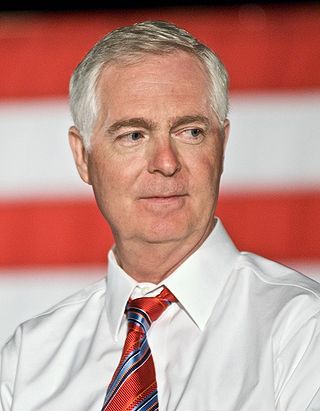
The 2000 North Carolina gubernatorial election was held on November 7, 2000. The general election was fought between the Republican nominee, former mayor of Charlotte Richard Vinroot and the Democratic nominee, state Attorney General Mike Easley. Easley won by 52% to 46%, and succeeded fellow Democrat Jim Hunt as governor. This election was the first North Carolina gubernatorial election since 1980 in which the winner of the gubernatorial election was of a different party from the winner of the concurrent presidential election.

The 2012 North Dakota gubernatorial election was held on November 6, 2012 to elect a Governor and Lieutenant Governor of North Dakota, concurrently with the 2012 U.S. presidential election, as well as elections to the United States Senate, elections to the United States House of Representatives and various state and local elections. Incumbent Governor Jack Dalrymple succeeded to the office when then-Governor John Hoeven resigned to take a seat in the U.S. Senate in 2010. Dalrymple, a member of the Republican Party, won election to a full term. Ryan Taylor was the Democratic nominee. Dalrymple prevailed with 63% of the vote; he declined to seek re-election in 2016.
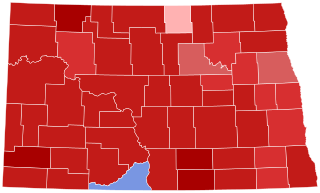
The 2016 United States Senate election in North Dakota was held November 8, 2016, to elect a member of the United States Senate to represent the State of North Dakota, concurrently with the 2016 U.S. presidential election, as well as other elections to the United States Senate in other states and elections to the United States House of Representatives and various state and local elections. The primaries were held June 14.
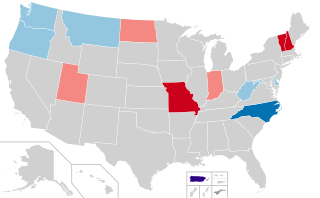
United States gubernatorial elections were held on November 8, 2016, in 12 states and two territories. The last regular gubernatorial elections for nine of the 12 states took place in 2012. The last gubernatorial elections for New Hampshire, Oregon, and Vermont took place in 2014, as Oregon held a special election due to the resignation of Governor John Kitzhaber, while the governors of New Hampshire and Vermont both serve two-year terms. The 2016 gubernatorial elections took place concurrently with several other federal, state, and local elections, including the presidential election, Senate, and House elections.

The 2016 North Dakota gubernatorial election was held on November 8, 2016, to elect the Governor and Lieutenant Governor of North Dakota, concurrently with the 2016 U.S. presidential election, as well as elections to the United States Senate, elections to the United States House of Representatives and various state and local elections. This would have been the first time North Dakotans selected a governor under new voter ID requirements, in which a student ID was insufficient identification to vote, but a court ruling in August 2016 struck the down the provision; the election was held under the 2013 rules.

Rick Becker is an American businessman and politician from Bismarck. He served in the North Dakota House of Representatives as an Independent, having been elected as a Republican.

The state of North Dakota held a series of elections on November 6, 2012. In addition to selecting presidential electors, North Dakotan voters selected one of its two United States Senators and its lone United States Representative, as well as seven statewide executive officers and one Supreme Court Justice. Primary elections were held on June 12, 2012.
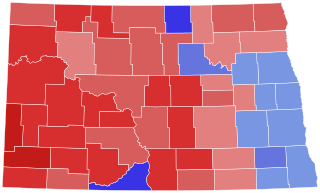
The 2018 United States Senate election in North Dakota took place on November 6, 2018, to elect a member of the United States Senate to represent the State of North Dakota, concurrently with other elections to the U.S. Senate, as well as other federal, state and local elections in North Dakota.
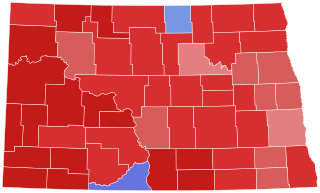
The 2020 North Dakota gubernatorial election was held on November 3, 2020, to elect the Governor and Lieutenant Governor of North Dakota, concurrently with other federal and statewide elections, including the U.S. presidential election. Incumbent Republican Governor Doug Burgum and Lieutenant Governor Brent Sanford were both re-elected to a second term.

The 1924 North Dakota gubernatorial election was held on November 4, 1924.


